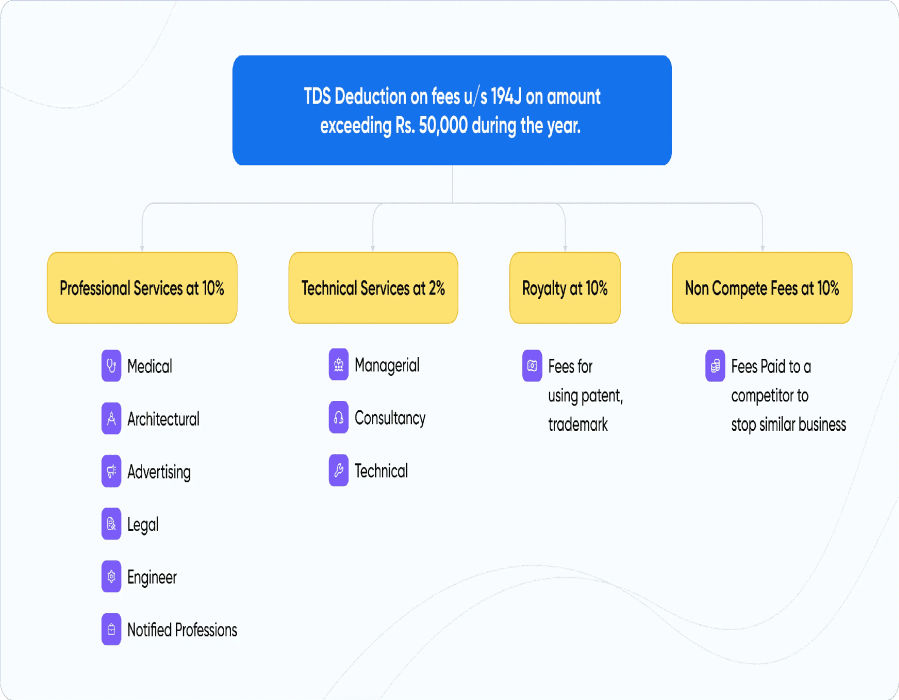Section 194J: TDS on Professional Fees and Technical Services
TDS under section 194J needs to be deducted on payments for professional fee, technical fee, royalty, non compete fee and director's remuneration. No TDS needs to be deducted of the payment during the financial year is within Rs. 50,000.
Key Highlights
- Section 194J deals with royalty, non-compete fees, professional and technical services.
- No TDS needs to be deducted up to a limit of Rs. 50,000 during the financial year.
- 2% TDS is deducted for technical fees. For other transactions, 10% TDS is deducted.
What is Section 194J?
Section 194J covers payment for professional, technical fees, royalty and non compete fees, including directors remuneration. TDS is deducted at 10% for professional services, royalty and directors remuneration, 2% for technical services. Where PAN is not provided by the recipient, 20% TDS is deducted. Payments of personal nature are not subject to TDS deduction under section 194J.

Budget 2025 Update
No TDS needs to be deducted of the payment throughout the financial year is within Rs. 50,000. This threshold limit was Rs. 30,000 until the preceding financial year.
Payments Covered
The types of payments to residents covered under this section are as follows:
- Fees for professional services
- Fees for technical services
- Remuneration or fees or commission paid to directors excluding salary (Example: sitting fees to attend board meetings)
- Royalty
- Non-compete fees, i.e., fees paid to not carry on any business or profession for a specified time and within certain geographical boundaries or fees paid not to share any technical knowledge or know-how.
Professional Services
- Services provided by a person to carry on medical, legal, architectural, or engineering professions.
- It also includes any other profession notified by the CBDT Board under Section 44AA.
Notified Professions by CBDT
CBDT has notified the profession of:
- Film artist
- Company secretary
- Accountancy
- Advertising
- Interior decoration
- Technical consultancy
- Authorized representatives
- Information technology under Section 44AA to date.
CBDT has further notified sportspersons, commentators, event managers, anchors, umpires and referees, physiotherapists, coaches and trainers, team physicians, and sports columnists under Section 194J.
Technical Services
As per income tax rules, ‘fees for technical services’ means managerial, technical, and consultancy services. It does not include payments considered as Salary by the recipient of such income.
- Technical services could be providing services that involve technical expertise or expertise in technology.
- The scope of managerial services can be defined as running and management of the business of the client.
- Consultancy services can be understood as advisory services wherein necessary advice and consultation are given to the clients for their business.
As per the Supreme Court’s judgment, technical service includes services provided by humans. It does not include services provided by machines or robots.
Royalty
Royalty means the payment made for:
- Transfer of rights or usage of an invention, model, design, trademark, patent, etc.
- Use of patents, inventions, designs, etc.
- Provide any information related to using an invention, patent, formula, etc.
- Transfer of rights related to scientific findings, literary work, films or videotapes for radio broadcasting but does not include consideration for the sale, exhibition, or distribution of cinematographic films.
- Providing any information related to technical, industrial, commercial or scientific knowledge, experience or skill.
Non-Compete Fees
Non-compete fees imply the payment made in cash or kind in return for an agreement that restricts them from sharing any license, patent, trademark, franchise, know-how, commercial or business rights, or information likely to be utilized elsewhere for processing, manufacture, or any other provisional service.
Persons Liable To Deduct Tax
Every person making a payment in the nature of fees for professional or technical services is liable to deduct tax at source. However, the below persons are not liable to deduct TDS under this section on such payments:
- In case of an individual or HUF carrying on a business: Where turnover does not exceed Rs 1 crore during the previous financial year.
- In case of an individual or HUF carrying on profession: Where turnover does not exceed Rs 50 lakh during the previous financial year.
To put it simply, all entities (other than individuals/HUF who are not required to do a tax audit in the preceding year) need to deduct tax (TDS) while paying fees for professional or technical services. In cases where 194J is not applicable, section 194M might be applicable.
Threshold Limit For Deducting Tax
- The tax has to be deducted in case the payment for professional and technical services is greater than Rs 50,000 during the year.
- Please note this Rs 50,000 maximum limit is applicable to each type of item or payment independently.
- For example, ABC company paid Mr. PK Rs 45,000/—as royalty and Rs 20,000/—as fees for technical services. ABC company is not liable to deduct TDS from these payments. This is because Rs 50,000 is a separate limit for each item, i.e. royalty and fees for technical services.
- However, there is no such limit for payments (commission, fees or remuneration) made to a director by the company. The tax will have to be deducted no matter how small the amount.
Note: The limit was Rs. 30,000 up to FY 2024-25.
Rate Of Deduction Of Tax Under Section 194J
| Nature of payments | Rate of tax deduction | Threshold Limit |
| Any payment of fees for technical service | 2% | Rs. 50,000 |
| Payments made to operators of call centers | 2% | Rs. 50,000 |
| Payment of royalty for sale, distribution or exhibition of cinematographic films. | 2% | Rs. 50,000 |
| Other Royalty | 10% | Rs. 50,000 |
| All other payments covered under this section (Like Professional Services) | 10% | Rs. 50,000 |
| Payee does not furnish his/her PAN | 20% | Rs. 50,000 |
| Payments made by the company to directors by way of fees, commissions or remuneration | 10% | Nil |
Time Limit For Deposit Of TDS
The tax should be deducted at the time of-
- Passing such entry in the accounts or
- Making the actual payment of the expense, whichever is earlier.
| Time of Payment | Non – Government Deductors | Deductors from the Office of Government |
| Payment made before 1st March | 7th day from the end of the month |
|
| Payment made in the month of March | April 30th |
|
Consequences Of Non-Deduction Or Late Deduction Of TDS
Not deducting the tax or late deduction of the tax has a two-fold consequence:
- Disallowance Of Part Of The Expenditure: 30% of the expenditure shall be disallowed in the year in which the expenditure is claimed (taken to the profit and loss account) – however, the 30% disallowed shall be re-allowed in the year in which the TDS is paid to the government.
- Levy Of Interest Until Date Of Payment: In case there is a delay in the payment of tax, interest has to be paid along with the TDS to the Government. The rate of interest is determined in the following manner:
- Where no deduction of tax has been made: Interest shall be payable at 1% per month/part of month from the date on which such tax was required to be deducted up to the date of actual deduction.
- Where tax has been deducted but not paid to the government: Interest shall be payable at 1.5% per month/part of month from the date on which such tax was deducted up to the date of payment to the government.
Examples Of TDS On Professional And Technical Services
Example 1: Mr Jay has availed professional service from Mr Veer in F.Y. 2025-26. The first payment was in April month of Rs 55,000, and the second payment was in December month of Rs 22,000. Let us check the TDS liability for both the payments for the F.Y. 2025-26 in three scenarios:
- Mr Jay is not liable for audit u/s 44AB.
- Mr Jay is liable for audit u/s 44AB, and he has taken service for personal purposes.
- A tax audit u/s 44AB applies to Mr. Jay in FY 2025-26, and he has used professional services for business purposes.
Analysis Of Situation 1
Since Mr Jay is not liable for Tax Audit u/s 44AB, he is not liable to deduct tax under this section while making payment to Mr Veer.
Analysis Of Situation 2
Although Mr Jay has taken professional services, that was for personal purposes. Hence, no TDS is required to be deducted while making payments for such services.
Analysis Of Situation 3
If a Tax Audit applies to Mr Jay and he avails professional services for business purposes, then TDS @ 10% must be deducted at Rs. 55,000 while making payment or crediting the accounts, whichever is earlier. This is because the transaction has exceeded the threshold limit of Rs. 50,000.
Similarly, since the transaction amount exceeded the threshold limit in the financial year, TDS should be deducted for all the payments made to Mr Veer. Hence, tax shall also be deducted at source on the second payment of Rs. 22,000.
Example 2: A Badminton Club has engaged Mr Pravin, a resident of India, as its coach at a remuneration of Rs 10 lakh per annum. Whether the club liable to deduct TDS from such payment?
Services provided by coaches for sports activities are notified as professional services under section 194J. The remuneration is more than Rs 50,000 per annum. Therefore, the Badminton Club is liable to deduct TDS under section 194J from the remuneration payable to the Coach, Mr Pravin.


